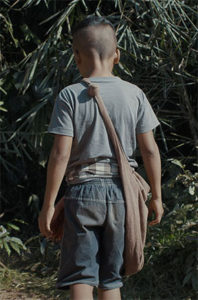
Time travel is obviously a cinematic genre, but are all films not in some capacities time travel films? Narratives jump in time. Even those which play out in relatively real time, are in fact, moving images recorded from long ago. Time can be seen as linear, but is this just a Westernized view of a concept seen to be more elliptical in other cultures?
Mattie Do’s The Long Walk is hyper aware of such questions as they pertain to time travel and cinema. So much so that she decides to graft them onto a classic ghost story and a serial killer narrative. The result is nothing short of astounding. An old man (Yannawoutthi Chanthalungsy) walks along a road with a spirit (Noutnapha Soydara). He attempts to rectify the past by encouraging his younger self (Por Silatsa) to undertake differing actions to the ones he took in taking care of his mother (Chanthamone Inoudome). What transpires is a deeply resonant look into the lies we tell ourselves about our traumas and our actions.
Do’s film is fascinatingly structured, and makes rare, if any, missteps. The pacing may be on the slower side, but the narrative is incomprehensibly gripping. I particularly enjoyed the film’s beautiful cinematography, and unique lighting styles. I have posed far too many questions thus far, but I leave you with one more: if we could change everything, would we become monsters? The Long Walk offers an answer that’ll likely open dozens of explorative avenues.
- Release Date: 9/10/2019

